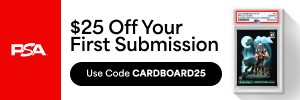
Law of Cards: Is the Wildcat Patent for Electronic Trading Cards Too “Abstract”?
In a letter to the court, the Wildcat defendants (including Panini and Topps) sought permission to file a 35 U.S.C. §101 summary judgment motion that would seek to invalidate the Wildcat electronic trading card patent. They argue the patent is, allegedly. too "abstract."
Legal translation: "Hey Judge, inventors are not allowed to claim stuff that is 'abstract,' and we think this patent is pretty out there. Can we get your blessing to file a motion to try and blow the patent up?"
35 U.S.C. §101/abstract motions are the latest craze for patent infringement defendants because, as one Federal Circuit judge lamented, case law in this area is a "murky morass." Any time the case law is anything but clear, that's a good place to litigate. Sometimes, even if an issue is close, given how nebulous everything is, you just might win.
Legal translation: Hey Paul, can you give us a legal translation of "abstract"?
Uh, no. I think Justice Prager’s description is worth repeating verbatim (only omitting case citations) to make the point:
In an attempt to explain what an abstract idea is (or is not) we tried the “machine or transformation” formula—the Supreme Court was not impressed. We have since acknowledged that the concept lacks of a concrete definition: “this court also will not presume to define ‘abstract’ beyond the recognition that this disqualifying characteristic should exhibit itself so manifestly as to override the broad statutory categories of eligible subject matter...”
Our opinions spend page after page revisiting our cases and those of the Supreme Court, and still we continue to disagree vigorously over what is or is not patentable subject matter.
This effort to descriptively cabin § 101 jurisprudence is reminiscent of the oenologists trying to describe a new wine. They have an abundance of adjectives—earthy, fruity, grassy, nutty, tart, woody, to name just a few—but picking and choosing in a given circumstance which ones apply and in what combination depends less on the assumed content of the words than on the taste of the tongue pronouncing them.
Legal translation: There is no legal definition of what is too "abstract," and the current test really is the "disqualifying characteristic should exhibit itself so manifestly." In other words, like the Supreme Court's test for obscenity, "We'll know it when we see it." But, since that is a subjective test, people are going to naturally disagree. So, it just depends.
Recently, the court of appeals for patent cases (the Federal Circuit) agreed to re-hear a §101 case en banc (legal translation: all of the judges get to sit in) and will hopefully issue an order giving better guidance in this area. The Federal Circuit has even asked the Patent Office to chime in. However, briefing has only just begun. A ruling won't be made until early next year.
Until then, patent litigators are still going to have to wade through the "murky morass."
Turning back to the Wildcat case, what does this mean?
My thoughts are, as the law currently stands, the defendants' motion (should the court let them file) should fail. The Wildcat patent claims an electronic trading card, which although not a physical item, is still a collectible item. It would seem to me that if something is collectable and can be traded with others, it's not too "abstract."
Because the Federal Circuit might come down with a new rule soon, the future is really too hazy to predict. It's a good move by the defendants to raise the issue now, especially when Wildcat has already called one of the issues at claim construction "somewhat metaphysical," too.
At a minimum, it'll require Wildcat to spend time and money to fight the issue. Best case scenario, it could end the whole case.
Plus, with a potential rule change coming down, they just might win.
Here's a copy of the defendants' letter to the judge.
The information provided in Paul Lesko's "Law of Cards" column is not intended to be legal advice, but merely conveys general information related to legal issues commonly encountered in the sports industry. This information is not intended to create any legal relationship between Paul Lesko, the Simmons Browder Gianaris Angelides & Barnerd LLC or any attorney and the user. Neither the transmission nor receipt of these website materials will create an attorney-client relationship between the author and the readers.
The views expressed in the "Law of Cards" column are solely those of the author and are not affiliated with the Simmons Law Firm. You should not act or rely on any information in the "Law of Cards" column without seeking the advice of an attorney. The determination of whether you need legal services and your choice of a lawyer are very important matters that should not be based on websites or advertisements.
 | Making purchases through affiliate links can earn the site a commission |
































